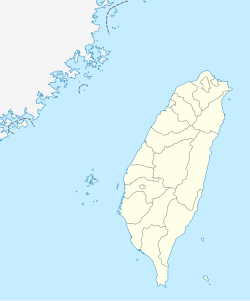Beipu
Beipu Township
北埔鄉 Hoppo | |
|---|---|
 | |
 Beipu Township in Hsinchu County | |
| Coordinates: 24°39′50″N 121°4′5″E / 24.66389°N 121.06806°E | |
| Country | Republic of China |
| Province | Taiwan |
| County | Hsinchu |
| Government | |
| • Type | Rural township |
| Area | |
| • Total | 50.6676 km2 (19.5629 sq mi) |
| Population (March 2023) | |
| • Total | 8,633 |
| • Density | 170/km2 (440/sq mi) |
| Website | www |
Beipu Township (Chinese: 北埔鄉; pinyin: Běipǔ Xiāng; Hakka: Pet-phû-hiông) is a rural township in Hsinchu County, Taiwan. Beipu is well known in Taiwan as a center of Hakka culture, especially for production of dongfang meiren tea and its special Hakkanese blends of tea and nuts called lei cha.
History
[edit]The town was the scene of the 1907 Hoppo Uprising against Japanese rule of Taiwan when insurgents of both Hakka and indigenous Saisiyat extraction attacked Japanese officials and their families. In retaliation, Japanese military and police killed more than 100 Hakka people, the majority of whom were young men from Neidaping (內大坪), a small village in the mountainous southern part of the township.[1]
Demographics
[edit]As of March 2023, Beipu had a population of 8,633, of whom 98 percent were Hakka.
Administrative divisions
[edit]The township comprises nine villages: Beipu, Nanxing, Dahu, Puwei, Shuiji, Nanpu, Dalin, Nankeng, and Waiping.
Tourist attractions
[edit]Notable natives
[edit]- Peng Tso-kwei, Minister of Council of Agriculture (1997–1999)
- Perng Shaw-jiin, Deputy Chairperson of Fair Trade Commission
- Huang Kuo-shu, former President of the Legislative Yuan (1961-1972).
References
[edit]- ^ Yang Ching-ting (28 Nov 2007). "Time to recall the Beipu Uprising". Taipei Times. p. 8. Archived from the original on 20 June 2018. Retrieved 9 Aug 2016.
External links
[edit]- Official website
 (in Chinese)
(in Chinese)


